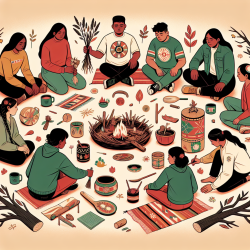The Cedar Project is a pivotal research initiative that sheds light on resilience among young Indigenous people who use drugs in Canada. The study emphasizes the profound role of cultural connectedness in enhancing resilience and mitigating vulnerabilities, such as those related to HIV and hepatitis C (HCV) infections. As practitioners working with Indigenous communities, understanding these dynamics can significantly improve our approaches to support and intervention.
The Importance of Cultural Connectedness
Cultural connectedness emerged as a critical factor in boosting resilience among participants of The Cedar Project. The study found that individuals who grew up in families that often lived by traditional culture or spoke their traditional language at home had significantly higher resilience scores. This highlights the protective power of cultural practices and languages, which serve as buffers against adversity.
For practitioners, integrating cultural elements into therapeutic practices can be transformative. Encouraging participation in cultural activities and facilitating access to language learning can foster a sense of identity and belonging, crucial for mental health and resilience.
Addressing Trauma and Vulnerability
The Cedar Project also underscores the impact of historical and lifetime traumas on young Indigenous people. Factors such as severe childhood emotional neglect, daily crack smoking, sexual assault, and blackout drinking were associated with diminished resilience. These findings highlight the need for trauma-informed care that acknowledges the complex historical contexts affecting these individuals.
Practitioners should prioritize creating safe spaces where young people can share their experiences without judgment. Training in trauma-informed approaches is essential to effectively support clients dealing with past traumas while promoting healing and resilience.
Promoting Help-Seeking Behaviors
The study revealed that participants who sought drug or alcohol treatment exhibited higher resilience scores. This suggests that encouraging help-seeking behaviors is crucial for enhancing resilience. Practitioners can play a vital role by providing resources and support systems that are accessible and culturally sensitive.
Building trust within the community is key to encouraging individuals to seek help. Collaborating with Indigenous leaders and incorporating traditional healing practices into treatment plans can make services more appealing and effective.
Moving Forward: A Call for Further Research
The insights from The Cedar Project are invaluable for practitioners aiming to support young Indigenous people effectively. However, there is still much to learn about the nuances of resilience in different cultural contexts. Further research is needed to explore innovative interventions that incorporate cultural strengths while addressing vulnerabilities.
Practitioners are encouraged to engage with ongoing research initiatives and collaborate with Indigenous communities to co-create solutions that are culturally relevant and sustainable.
Conclusion
The Cedar Project highlights the critical role of cultural connectedness in fostering resilience among young Indigenous people facing significant challenges. By integrating these insights into practice, we can enhance our support strategies and contribute to the well-being of these communities.
To read the original research paper, please follow this link: The Cedar Project: resilience in the face of HIV vulnerability within a cohort study involving young Indigenous people who use drugs in three Canadian cities.










